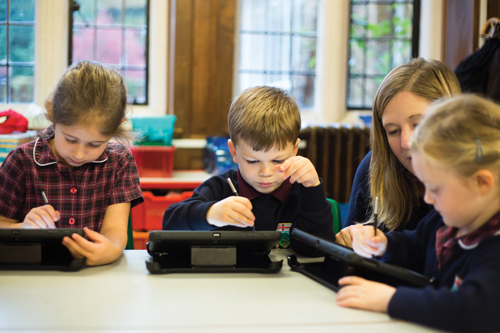
Starting school marks a major milestone in a child’s development and it can also represent a time of mixed emotion – and we are not just talking about the child here! We asked Sally Livingston, Reception class teacher at Barrow Hills School on top tips for parents to help prepare their child for this momentous step in their learning journey.
• If your child hasn’t attended nursery or kindergarten, it is a good idea to get them used to being in a social setting outside of the family home. Young children need to learn how to interact with their peers and in particular, they need to get to grips with the concept of playing together harmoniously – and that all-important life lesson, learning to share!
• Schedule your child time to play independently so that they begin to appreciate that they don’t always need to be entertained but rather can be occupied by becoming fully engrossed in an activity, for example, building a model from building blocks.
• Build a good rapport with the Reception staff. If your child shows any signs of becoming distressed at the time of drop off, you need to be secure in the knowledge that the staff are going to step in to comfort your child. Don’t be tempted to loiter, this will make it more difficult for your little one, be upbeat and reassuring and leave. Chances are they will settle within minutes of you leaving and will be easily distracted by all the new toys and friends that await them! Equally, if all is going well at school but you are experiencing some shifts in behaviour at home, always talk to the teacher so that you can work together to demonstrate a consistent approach in encouraging the child to respect any clear boundaries that have been set. We are here to work alongside parents, to help children develop in a safe, protected and most importantly happy setting and no problem is too small to discuss.
• Help your child with their learning by putting into practice outside of the classroom some of the lessons that they are being taught – and make it fun! For example, when you are in the supermarket, get your child to help out by using their numbers and colours to select items; encourage them to identify shapes in their home/outdoor environment; ask them to help look out for letters on road signs.
• Being at school is incredibly tiring for a young child and represents a major transition even if they attended nursery, so make a point of getting into a good bedtime routine and ensuring that your little one gets their required quota of sleep. We all know the negative effects of a lack of sleep on us as adults, so for children who are expending so much energy on simply growing and running around, it is even more important. A common error that parents make is to stop the traditional bedtime reading routine, replacing this instead with ‘school related’ reading which may have been set as homework. Remember, now more than ever your child
needs to go to sleep settled and secure, so the familiar and comforting bedtime read should not be dropped!
• By Reception most children have mastered toilet training but don’t be surprised when accidents happen. Instead advise them to always ask the teacher if they feel the need to use the bathroom and if they do get caught short, to tell an adult rather than be left in discomfort. Make a point of speaking to the teacher if you know that this can be a bit of a problem so that your child is actively encouraged to use the toilet and feels supported.
• Encourage your child to be independent: learning to put on their coat unaided, having a go at doing up buttons and zips, putting on their shoes – all of these small changes will help them cope in the reception environment although, of course, there is always plenty of reassurance and help at hand!
• Begin laying the foundations for good manners whilst eating away from home. Try and make time to eat together as a family and actively support your child so that they learn how to use tricky knives and forks, rather than rely solely on their hands! Persuade them to try and use the knife to cut food rather than simply waiting for help to arrive!
• Start early with helping your child to adopt healthy eating habits, steering them towards the right food options – but of course still allowing the appropriate treats. Try to explain the importance of eating healthier food and how it will help them in the future, using words that your child is able to understand, rather than simply laying down the law!
www.barrowhills.org
Next open mornings 26 and 29 April











